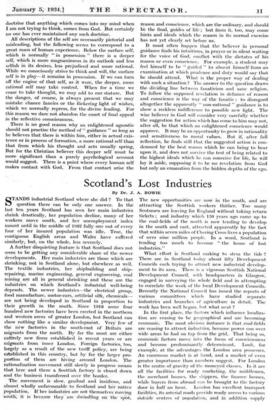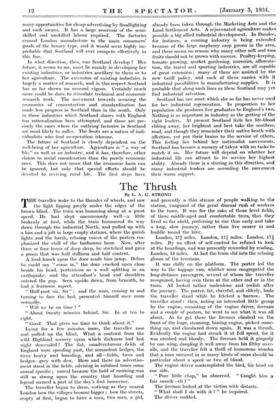Scotland's Lost Industries
By Dr. J. A. BOWIE OTANDS industrial Scotland where she did ? To that question there can be only one answer. In the last ten years Scotland has seen her main industries shrink drastically; her population decline, many of her workers move south, and her unemployment index Mount until in the middle of 1932 fully one out of every four of her insured population was idle. True, the contiguous English areas and Wales have suffered similarly, but, on the whole, less severely.'
A further disquieting feature is that Scotland does not seem to be getting any considerable share of the newer developments. Her main industries are those -which are shrinking, not in Scotland alone; but elsewhere as well. The textile industries, her shipbuilding and ship- repairing, marine engineering, general engineering, coal mining are all in general shrinking and these are the industries on which Scotland's industrial well-being depends. The newer industries—the electrical group, food manufacture, motor-ears, artificial silk, chemicals— are. not being developed in Scotland in Proportion to 'their growth in the south. Since 1918 some four hundred new 'factories have-been erected in the northern and western areas of greater London, but Scotland can show nothing like a similar develoPment. Very' few of the new -factories in the southeast of• Britain are migrants from the north. BY far the most are either entirely new firms established in recent years or are migrants from - inner London. Foreign factories, too, largely as a result of the new tariff policy, are being established in this country, but by far the larger pro- portion of them are hiving around London. The rationalization movement still slowly in progress means that here and there a Scottish factory is closed down and the bitsinett transferred over the border. • The movement is slew, gradual and insidiOus, and almost wholly unfavourable 'to Scotland and her native Population. If her industries are not themselves moving 'sOiith. it is • because they are dwindling on the 4;4. The new opportunities are now in the south, and are attracting the Scottish workers thither. Too many Scotsmen are leaving for England without taking return tickets ; and industry which 150 years ago came up to the coal-fields of the north is now tending to develop in the south and east, attracted apparently by the fact that within seven miles of Chairing Cross lives a population of over nine million people. In a word, Scotland is tending too much to become "the home of lost industries."
What effort is Scotland making to stem the tide ? There are in Scotland today about fifty Development Councils each trying to attract new industrial develop- ment to its area. There is a vigorous Scottish National Development Council, with headquarters in Glasgow, engaged in surveying the whole field and in attempting to correlate the work of the local Development Councils. Recently the National Council has issued the reports of various committees which have studied separate industries and branches of agriculture in detail. The work has been well begun, but what next ?
In the first place, the factors- which influence localiza- tion are ceasing to be geographical and are becoming economic: The most obvious instance is that coal-fields are ceasing to attract industries, because power can over wide areas be had on tap from the 'grid. That being so, economic factors move into the focus of consciousness and become predominantly determinant. Look, for example, at the advantages the London area possesses. An -enormous Market is at hand, and a market of even greater importance than numbers suggest. For London is the centre of gravity of the moneyed classes. In it are all the facilities for ready marketing, the middlemen, the merchant' houses, the shippers, the finance houses, while buyers from abroad can be brought to the factory door in half an hour. London has excellent transport facilities, its arterial roads provide ready access to various dutside centres of population, and in addition supply many opportunities for cheap advertising by floodlighting and such means. It has a large reservoir of the semi- skilled and unskilled labour required. The factories around London manufacture in the main consumers' goods of the luxury type, and it would seem highly im- probable that Scotland will ever compete effectively in this line.
In what direction, then, can Scotland develop ? Her future, it seems to me, must lie mainly in developing her existing industries, or industries ancillary to them or to her agriculture. The extension of existing industries is largely a matter of research, and in this respect Scotland has so far shown no unusual vigour. Certainly much more could be done to stimulate technical and economic research work. The movement towards securing the economies of concentration and standardization has made less progress in Scotland than in the south. Only in those industries which Scotland shares with England has rationalization been attempted, and those are pre- cisely the cases where the outlying factories in Scotland are most likely to suffer. The Scots are a nation of indi- vidualists who find co-operation irksome.
The future of Scotland is closely dependent on the well-being of her agriculture. Agriculture is "a way of life," as well as an industry, and it has, therefore, other claims to social consideration than the purely economic ones. This does not mean that the economic basis can be ignored, but only that special efforts should be devoted to reviving rural life. The first steps have already been taken through the Marketing Acts and the Land Settlement Acts. A rejuvenated agriculture makes possible a big allied industrial development. In Dundee, for instance, a canning industry is being extended because of the large raspberry crop grown in the area, and there seems no reason why many other soft and tree fruits should not be grown with success. Poultry-keeping, tomato growing, market gardening, nurseries, afforesta- tion, the travel and sporting industries, are all capable of great extension ; many of them are assisted by the new tariff policy, and each of them carries with it industrial possibilities in manufacturing supplies. It is probable that along such lines as these Scotland may yet find industrial salvation.
Scotland has one asset which she so far has never used for her industrial regeneration. In proportion to her population she produces five graduates to England's two. Nothing is so important in industry as the getting of the right leaders. At present Scotland feels her life-blood ebbing away, her brightest and best take the southern road, and though they remember their native heath with affection, yet put their brains to the service of others. This feeling lies behind her nationalist movements. Scotland has become a nursery of talent with no tasks to match it on. Her future will depend on whether her industrial life can attract to its service her highest ability. Already there is a stirring in this direction, and many industrial leaders are according the movement their warm support.







































 Previous page
Previous page